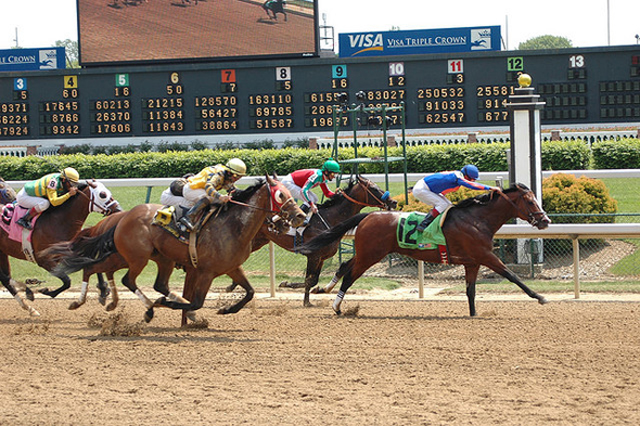WASHINGTON – Lawmakers on Capitol Hill are now shifting their focus to doping in horse racing, after a decade of confronting Major League Baseball’s steroid epidemic.
Sen. Tom Udall, D-N.M., and other members of the Senate Committee on Commerce, Science and Transportation, invited eight of the biggest names in the equine industry to testify about the sport’s growing drug problem on Thursday.

Photo courtesy of John Athayde (boboroshi/Flickr)
“Horse racing has a proud heritage, but the sport has run off the rails,” Udall said. “The chronic abuse of horses with painkillers and other drugs is just plain wrong.”
Unlike other high-profile sports in the U.S., horse racing does not have a central office or commissioner that can implement a drug policy. Instead, each state sets its own rules.
“State racing commissions routinely impose small fines and short suspensions,” Udall said. “But there is minimal deterrence, and chronic doping continues unabated.”
As a result, Udall said it’s time for the federal government to step in and make changes. Last May, he introduced a bill that would ban performance-enhancing drugs from horse racing. The legislation would prohibit all race day medications, require drug testing of race horses by independent labs and kick out “cheaters” after three violations. The Federal Trade Commission would be responsible for enforcing the rules.
All of the witnesses at the hearing agreed with Udall that a uniform set of standards would help eradicate the problem.
“Because many racing commissions do not do a good job, the fabric of the sport is unraveling and the public has lost faith in the quality of the product,” said Barry Irwin, CEO of Team Valor International. “This is why our industry needs federal assistance.”
But not everyone was on board with Congress creating those standards. Kent Stirling, the chairman of the National Horsemen’s Benevolent and Protective Association, said the states should retain the power to monitor the sport.
“Rules should be implemented by means of a national compact among the states and not imposed by the federal government, which has no experience or expertise in horse racing,” Stirling said.
Even those who support the federal government getting involved said Udall’s “three strikes and you’re out” policy was not strong enough.
“I think the thing that would solve this the best is if we took some of these trainers out in handcuffs,” said Jeffrey Gural, the chairman and managing partner of American Racing and Entertainment. “When someone gets caught, that should be the end of it.”
However, some in attendance were worried that their concerns were falling on deaf ears. Only three of the committee’s 25 members made an appearance at the hearing. Udall was the only one to stay for its entirety.
“It disappoints me,” said Tom Persechino, executive director of competition and breed integrity for the American Quarter Horse Association. “You have to question how important it is in Washington when only one guy is up there.”
